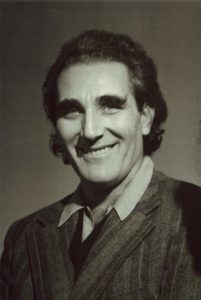
Alexander Francis Horn, 1929 – 2007, was a theater director, actor, and playwright, and teacher of the Fourth Way system of awakening in the 1960s and 1970s. Raised in Chicago, he attended the University of Chicago, and began working with theater groups there. During this time he took a group on a visit to Rodney Collin, who had moved to Mexico following the death in 1947 of P.D. Ouspensky, Gurdjieff’s pupil. In the 1960s, Alex was affiliated with the Gurdjieff Foundation of New York. In 1960 he went to England and visited the Coombe Springs group led by J.G. Bennett, one of Gurdjieff’s early pupils. By 1965, he had established his first theater, The Everyman Theater, in San Francisco.
Alex Horn created a series of plays centering around the esoteric interpretation of current events, including the assassinations of John F. Kennedy and Martin Luther King. His plays point to inner meanings of outer events, even on a cosmic scale. As he wrote in his preface to his plays:
In The Idea of the Theatre, Francis Ferguson states that there have been three great theatres in the Western tradition: the Greek, Aeschylus and Sophocles; the Elizabethan, Shakespeare; and the medieval, Dante (taken as theatre). All three were cosmic theatres. All theatres since Shakespeare have been partial perspectives.
The mirror has cracked, that great mirror of Man which in Hamlet is held up to the world to reveal all the multiple facets on various levels of Man, the micro-cosmos that reflects his entire society and the great world, the macro-cosmos. This mirror of man is now in fragments, in as many fragments as there are different varieties of theatre. Therefore, for the restoration of cosmic theatre there must be a restoration of man. Man, fallen into multiplicity, must be restored to his original unity. The great work of the cosmic theatres of the past–the Orestaia, the Oedipus trilogy of Sophocles, Hamlet, King Lear, The Tempest, the Divine Comedy–contain the psychology of man’s development, from multiplicity to unity, and are in fact the restoration of the divinity of man. This is his evolution.
One student recalled of him:
His understanding of the gods was immediate and personal, as we see in his plays. His dramatic language was influenced by the King James Bible, the poetry of Rilke, T.S. Eliot, Yeats, and Shakespeare. He saw the possibilities of man’s possible evolution, but also of the terrible destruction of man’s spirit in the modern age.
The dichotomy of the two sides of man, angelic and demonic, and the split in man’s field of endeavor as he rises to take full responsibility for his planetary existence—having to chose between the roles of priest and king–are key to the dramatic struggle in his works.
In the 1970s, Alex moved his theater to downtown San Francisco, renaming it The Theater of All Possibilities.
At Alex Horn’s funeral eulogy, these lines of his were read:
The Promethean spirit of man, through countless ages, has labored to break the fatal embrace of Earth which has kept us chained to the wheel of life, prisoners of a gravitation that denies us the grace of Heaven. But we are children of the starry world, and not even our mother, Earth, shall keep us from our birthright.